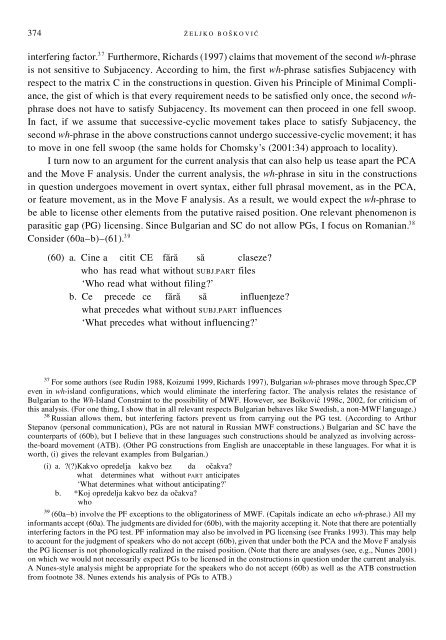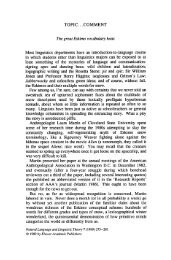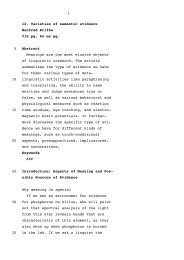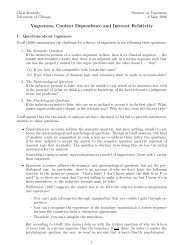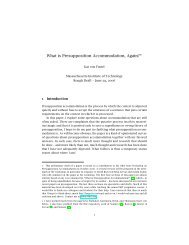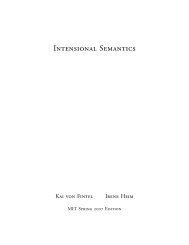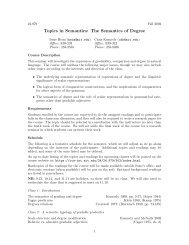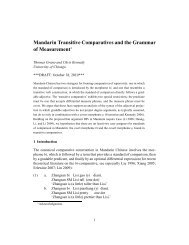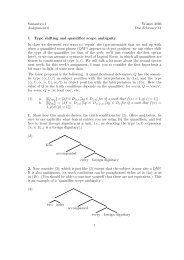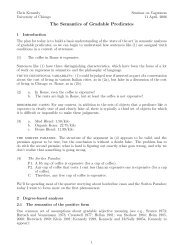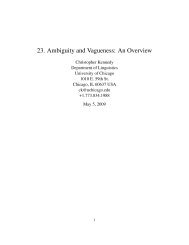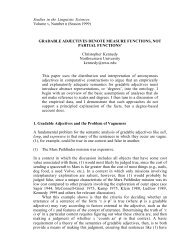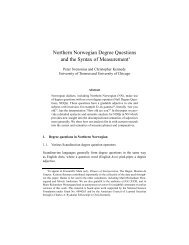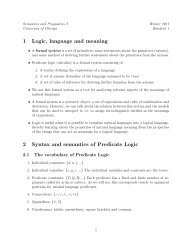On Multiple Wh-Fronting - University of Chicago
On Multiple Wh-Fronting - University of Chicago
On Multiple Wh-Fronting - University of Chicago
You also want an ePaper? Increase the reach of your titles
YUMPU automatically turns print PDFs into web optimized ePapers that Google loves.
374 ZÏ E L J K O B O SÏ K O V I Ćinterfering factor. 3 7 Furthermore, Richards (1997) claims that movement <strong>of</strong> the second wh-phraseis not sensitive to Subjacency. According to him, the first wh-phrase satisfies Subjacency withrespect to the matrix C in the constructions in question. Given his Principle <strong>of</strong> Minimal Compliance,the gist <strong>of</strong> which is that every requirement needs to be satisfied only once, the second whphrasedoes not have to satisfy Subjacency. Its movement can then proceed in one fell swoop.In fact, if we assume that successive-cyclic movement takes place to satisfy Subjacency, thesecond wh-phrase in the above constructions cannot undergo successive-cyclic movement; it hasto move in one fell swoop (the same holds for Chomsky’s (2001:34) approach to locality).I turn now to an argument for the current analysis that can also help us tease apart the PCAand the Move F analysis. Under the current analysis, the wh-phrase in situ in the constructionsin question undergoes movement in overt syntax, either full phrasal movement, as in the PCA,or feature movement, as in the Move F analysis. As a result, we would expect the wh-phrase tobe able to license other elements from the putative raised position. <strong>On</strong>e relevant phenomenon isparasitic gap (PG) licensing. Since Bulgarian and SC do not allow PGs, I focus on Romanian. 3 8Consider (60a–b)–(61). 3 9(60) a. Cine a citit CE faÆ raÆ saÆ claseze?who has read what without SUBJ.PART files‘<strong>Wh</strong>o read what without filing?’b. Ce precede ce faÆ raÆ saÆ influenţeze?what precedes what without SUBJ.PART influences‘<strong>Wh</strong>at precedes what without influencing?’37 For some authors (see Rudin 1988, Koizumi 1999, Richards 1997), Bulgarian wh-phrases move through Spec,CPeven in wh-island configurations, which would eliminate the interfering factor. The analysis relates the resistance <strong>of</strong>Bulgarian to the <strong>Wh</strong>-Island Constraint to the possibility <strong>of</strong> MWF. However, see BosÏ ković 1998c, 2002, for criticism <strong>of</strong>this analysis. (For one thing, I show that in all relevant respects Bulgarian behaves like Swedish, a non-MWF language.)38 Russian allows them, but interfering factors prevent us from carrying out the PG test. (According to ArthurStepanov (personal communication), PGs are not natural in Russian MWF constructions.) Bulgarian and SC have thecounterparts <strong>of</strong> (60b), but I believe that in these languages such constructions should be analyzed as involving acrossthe-boardmovement (ATB). (Other PG constructions from English are unacceptable in these languages. For what it isworth, (i) gives the relevant examples from Bulgarian.)(i) a. ?(?)Kakvo opredelja kakvo bez da ocÏ akva?what determines what without PART anticipates‘<strong>Wh</strong>at determines what without anticipating?’b. *Koj opredelja kakvo bez da ocÏ akva?who39 (60a–b) involve the PF exceptions to the obligatoriness <strong>of</strong> MWF. (Capitals indicate an echo wh-phrase.) All myinformants accept (60a). The judgments are divided for (60b), with the majority accepting it. Note that there are potentiallyinterfering factors in the PG test. PF information may also be involved in PG licensing (see Franks 1993). This may helpto account for the judgment <strong>of</strong> speakers who do not accept (60b), given that under both the PCA and the Move F analysisthe PG licenser is not phonologically realized in the raised position. (Note that there are analyses (see, e.g., Nunes 2001)on which we would not necessarily expect PGs to be licensed in the constructions in question under the current analysis.A Nunes-style analysis might be appropriate for the speakers who do not accept (60b) as well as the ATB constructionfrom footnote 38. Nunes extends his analysis <strong>of</strong> PGs to ATB.)


